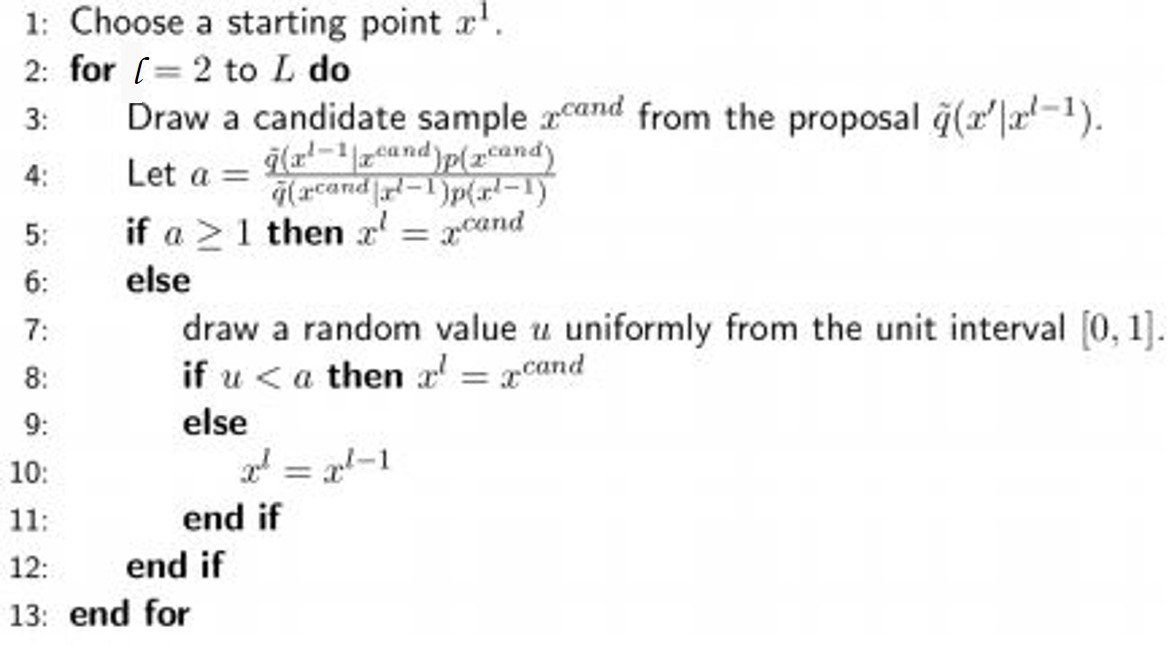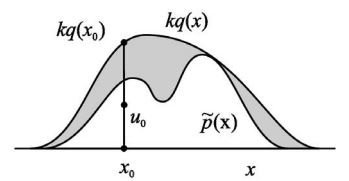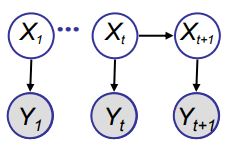Approximate Inference
(Summarized from the lecture notes from cmu spring17-10708, Eric Xing)
Motivation
When we want to know \(E_p[f(x)]\), where \(x \sim p(x)\), we need to know the distribution of \(x\). One way is to use a sampled base average to approximate the expectation \(E_p[f(x)] = \frac{1}{N} \sum_{t=1}^{N}f(x^{(t)})\). However a few challenges remain that:
- how to draw samples from a given dist. (not all distributions can be trivially sampled)?
- how to make better use of the samples (not all sample are useful, or eqally useful, see an example later)?
- how to know we’ve sampled enough? (For a model with hundreds or more variables, rare events will be very hard to garner evough samples even after a long time or sampling)
So we have a few methods belong to the Monte Carlo methods:
- Rejection sampling: Create samples like direct sampling, only count samples which is consistent with given evidences.
- Likelihood weighting: Sample variables and calculate evidence weight. Only create the samples which support the evidences.
- Markov chain Monte Carlo (MCMC): Metropolis-Hasting, Gibbs
Rejection sampling:
How to generate samples given a distribution \(p(x)\)? How to convert samples from a Uniform[0,1] generator to samples that follows distribution \(p(x)\)? One way is to compute cdf \(h(y)\), which is a uniform non-decreasing function in [0,1]. Then for every sample \(u\) from Uniform[0,1], we can get \(x = h^{-1}(u)\) that \(x \sim p(x)\). But this won’t work if \(\hat{p}(x)\) is not normalized (assume \(p(x) = \frac{\hat{p}(x)}{Z}\)). This leads to the idea of rejection sampling:
- Come up with a probability distribution \(Q(x)\) (usually Gaussian) that we can easily draw samples from.
- Find a constant \(k\) such that \(\frac{\hat{p}(x)}{kQ(x)} < 1\).
- Draw a sample \(x_0\) from \(Q\)
- Accept a sample with probability \(\frac{\hat{p}(x)}{kQ(x)}\): sample \(u_0\) from Uniform[0,\(kQ(x_0)\)], accept the sample if \(u_0 < \hat{p}(x_0)\)
And it can be proved that the accpected samples follows \(p(x)\).
Pitfalls:
- Scale badly with dimensionality (acceptance rate exponentially decreases)
- If \(Q(x)\) is chosen badly (if \(p\) and \(Q\) both are Gaussian), acceptance rate is really low
Importance sampling:
A different idea is to retain all the samples and re-weight them while computing their mean. \(E_p[f(x)] = \int f(x)p(x)dx = \int f(x) \frac{p(x)}{q(x)}q(x)dx \approx \frac{1}{N} \sum_{n=1}^{N} f(x^{(n)}) \frac{p(x^{(n)})}{q(x^{(n)})}\), where \(x^{(n)} \sim q(x)\). This a an unbiased estimator. However, when we only have unnormalized distribution \(\hat{p}(x)\), \(E_p[f(x)] \approx \sum_{n} f(x^{(n)})w^{(n)}\), where \(w^{(n)} = \frac{\hat{p}(x^{(n)})}{\hat{q}(x^{(n)})}\Big/\sum_l \frac{\hat{p}(x^{(l)})}{\hat{q}(x^{(l)})}\). This is biased.
Pitfalls:
- Scale badly with dimensionality
- Unless \(p\) is close \(q\) (\(p=q\) gives the best performance), there will be a small number of dominant weights leading to a high variance. This is particularly evident in high-dimensions
- This problem can be alleviated by resampling the weights
Weighted resampling
- Draw \(N\) samples \(\{x\}_N\) from \(Q\)
- Constructing weights: \(w^{(n)} = \frac{\hat{p}(x^{(n)})}{\hat{q}(x^{(n)})}\Big/\sum_l \frac{\hat{p}(x^{(l)})}{\hat{q}(x^{(l)})}\)
- Subsample \(x\) from \(\{x\}_N\) w.p.t. \(\{w\}_N\)
Particle filters
- Apply the resampled importance sampling to a temporal high dimensional distribution \(p(x_1, \dots, x_t)\). The problem can be reduced to finding a proposal distribution for an one-dimensional problem.
- Goal is to yield samples from posterior \(p(X_t|Y_{1:t})\)
Markov Chain Monte Carlo
Instead of using a fixed proposal \(Q(x)\) as the previous methods, we use \(Q(x^{\prime} | x)\) where \(x^{\prime}\) is the new state being sampled, and \(x\) is the previous sample. So as \(x\) changes, \(Q(x^{\prime} | x)\) can also change. One of the most famous MCMC algorithm is Metropolis-Hastings algorithm.
Metropolis-Hastings
- Draws a sample \(x^{\prime}\) from \(Q(x^{\prime} ; x)\)
- The new sample \(x^{\prime}\) is accepted or rejected with some probability \(A(x^{\prime} ; x)\)
- This acceptance probability is \(A(x^{\prime} ; x) = \min(1, \frac{p(x^{\prime})Q(x ; x^{\prime})}{p(x)Q(x^{\prime} ; x)})\)
- \(A(x^{\prime} ; x)\) is like a ratio of importance sampling weights
- \(p(x^{\prime})Q(x ; x^{\prime})\) is the importance weight for \(x^{\prime}\), \(p(x)Q(x^{\prime} ; x)\) is the importance weight for x.
- We divide the importance weight for \(x^{\prime}\) by that of \(x\)
- Notice that we only need to compute \(p(x^{\prime})/p(x)\) rather than \(p(x^{\prime})\) or \(p(x)\) separately
- \(A(x^{\prime} ; x)\) ensures that, after sufficiently many draws, our samples will come from the true distribution.
Steps for the algorithm:
First we have a burn-in stage: while samples have not converged, do:

Gibbs sampling
Gibbs Sampling is an MCMC algorithm that samples each random variable of a graphical model, one at a time. GS is a special case of the MH algorithm.


